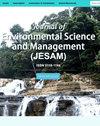评估水闸:菲律宾拉古纳湾两个村家庭的社会资本利用适应洪水
IF 0.3
4区 环境科学与生态学
Q4 ENVIRONMENTAL SCIENCES
引用次数: 0
摘要
持续的气候危机直接影响了社会体系。为了应对环境变化,社区通过重塑日常生活以实现可持续性和生存来重新配置自己的能力。本研究的主要目的是考察Brgy选定的社区成员如何利用社会资本。圣安东尼奥和布吉。菲律宾拉古纳湾的Tagumpay是一种适应洪水的形式。布尔吉Purok 6的家庭。圣安东尼奥和布吉。Tagumpay分别是通过有目的的抽样和完全列举选出的。0.05%显著性水平的关联手段的使用表明,特定的社会人口变量与社区内的社会资本资源有直接关联。参与者的适应能力通过与他们的支持系统的关系以及他们积极参与团体/协会活动而得到加强。对于对社区的依恋,与大多数社会人口特征关系最显著的变量是通过正式和非正式组织的存在来加强集体社区精神。获得资源和服务有助于提高社区成员的适应能力。当金融和社会服务触手可及时,适应性变得更加明显。邻居之间的亲密关系有助于增强他们的适应能力。在社区关系中,可信度被认为是最重要的价值。建议加强社会资本,以提高适应能力。本文章由计算机程序翻译,如有差异,请以英文原文为准。
Assessing the Flood Gates: Utilization of Social Capital as Adaptation to Flooding of Selected Households in Two Barangays in Bay, Laguna, Philippines
The persistent climate crisis has directly affected the social system. In response to environmental changes, communities reconfigure their abilities by reshaping their everyday lives for sustainability and survival. This study’s main objective is to examine how social capital was utilized by selected community members of Brgy. San Antonio and Brgy. Tagumpay in Bay, Laguna, Philippines as a form of adaptation to flooding. Households from Purok 6 of Brgy. San Antonio and Brgy. Tagumpay were selected through purposive sampling and complete enumeration, respectively. Utilization of the means of association at 0.05% level of significance showed that specific socio-demographic variables had a direct association with social capital resources within the community. The adaptive capacity of the participants was strengthened through relationships with their support system and their active participation in group/association activities. For attachment to neighborhood, the variable that had the most significant relationship with most of the socio-demographic characteristics was the strengthening of the spirit of collective community through the existence of formal and informal organizations. Access to resources and services helped to enhance the adaptive capacity of the community members. Adaptability became more apparent when financial and social services were within one’s reach. The closeness of relationships between neighbors helped to strengthen their adaptive capacity. In community relationships, trustworthiness was considered as the most significant value. It is recommended that social capital be strengthened to enhance adaptive capacity.
求助全文
通过发布文献求助,成功后即可免费获取论文全文。
去求助
来源期刊

Journal of Environmental Science and Management
ENVIRONMENTAL SCIENCES-
CiteScore
0.90
自引率
0.00%
发文量
10
审稿时长
2 months
期刊介绍:
The Journal of Environmental Science and Management (JESAM) is an international scientific journal produced semi-annually by the University of the Philippines Los Baños (UPLB).
JESAM gives particular premium to manuscript submissions that employ integrated methods resulting to analyses that provide new insights in environmental science, particularly in the areas of:
environmental planning and management;
protected areas development, planning, and management;
community-based resources management;
environmental chemistry and toxicology;
environmental restoration;
social theory and environment; and
environmental security and management.
 求助内容:
求助内容: 应助结果提醒方式:
应助结果提醒方式:


